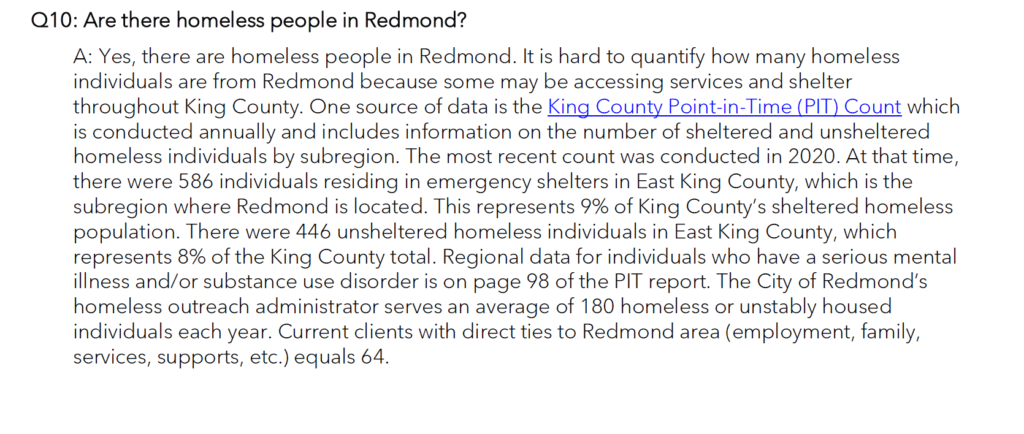Downtown Redmond Plymouth Housing
On January 19, 2024, before the City of Kenmore made the final decision on the Plymouth Housing project, Redmond Director of Planning, Carol Helland, exchanged emails with ARCH Executive Director, Lindsay Masters, and discussed giving away the Motely Zoo site (the Cleveland parcel) to the Plymouth project. She even said, “We could refill the $Kenmore funding gap. I have the money.”

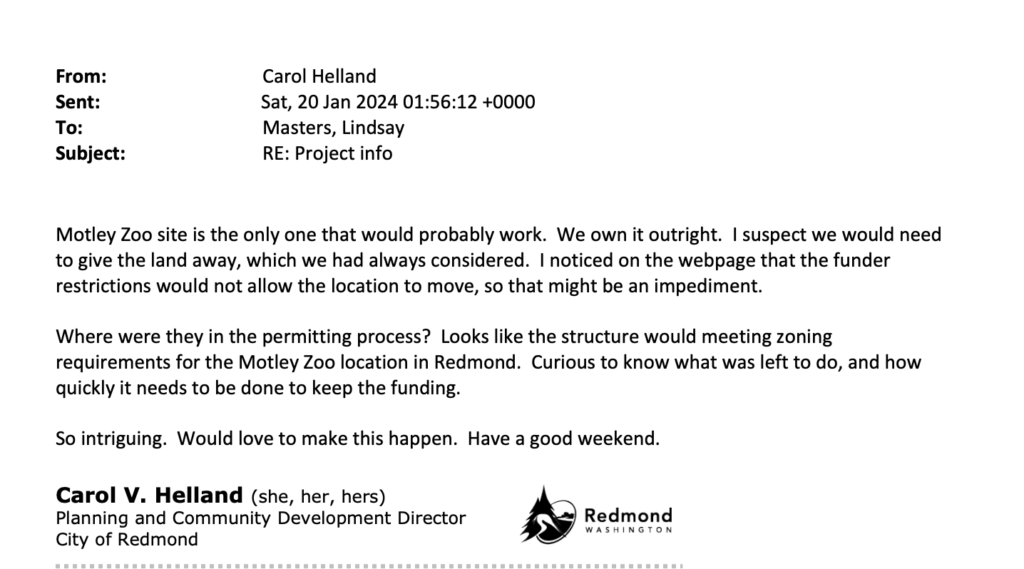
On January 19, 2024, Redmond Director of Planning, Carol Helland, approached Redmond COO, Malisa Files, and discussed which land would be a good fit for the Plymouth project.
On January 22, 2024, Kenmore City Council rejected the “bait and switch” Plymouth Housing project. Kenmore Deputy Mayor Melanie O’Cain explained why they rejected the project: “This was a long term decision, a 42 million dollar decision, that was going to to serve 100 people, who, maybe, 10, would be from our region, from our city, based on the facts and data of who are homeless or in need in our community. “
On January 22, 2024, Redmond COO, Malisa Files brought the project to Mayor Birney’s attention.
On February 3, 2024, Director Helland said in email, “The state permitting requirements mandate public notice and engagement and that has been used effectively by opponents of these types of projects to derail them. Redmond wants to help the ARCH coalition.”
On February 4, 2024, the lobbyist for the City of Redmond sent an email to Rep. Vandana Slater and Senator Patty Kuderer, and asked them “to appropriate funds out of the existing TransitOriented Development account” to help close a $4.2 million funding shortfall. The lobbyist said, “it does require some bold action.” In her email to Senate Capital Budget Chair, Mark Mullet, Senator Kuderer said, “we may need some creative thinking”.
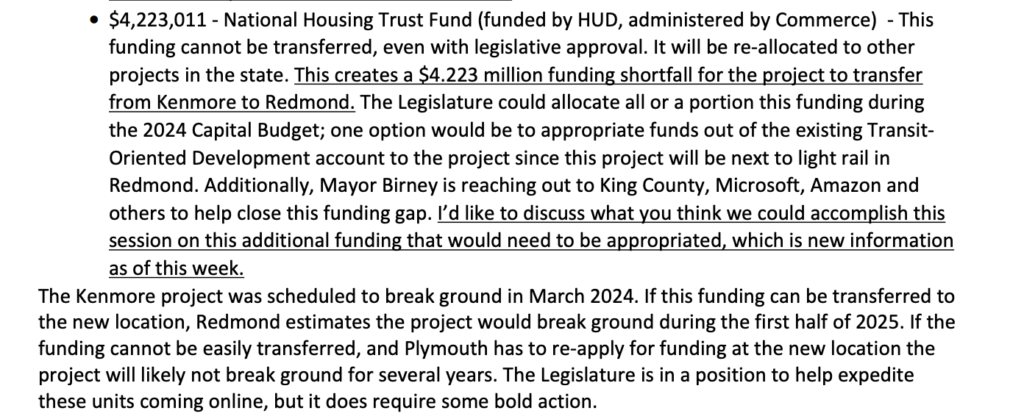

On February 6, 2024, Redmond City Council had a behind the door Executive session discussing the transfer of the Cleveland parcel (16725 Cleveland Street, Redmond), a public land the city acquired for $5.5 million in 2019, to Plymouth Housing at no cost. Mayor Birney announced before the Executive session, “at the time of the adjourn of the executive session, action is expected to be taken at that time in open session.” And according to the meeting scripts prepared by the Mayor’s staff, the Mayor was prepared to ask the Council to vote on the land transfer on the day of the Executive session without any prior announcement to the public. The draft motion also includes an interesting sentence, “The transfer of property shall occur after the existing lease of the land is resolved…”
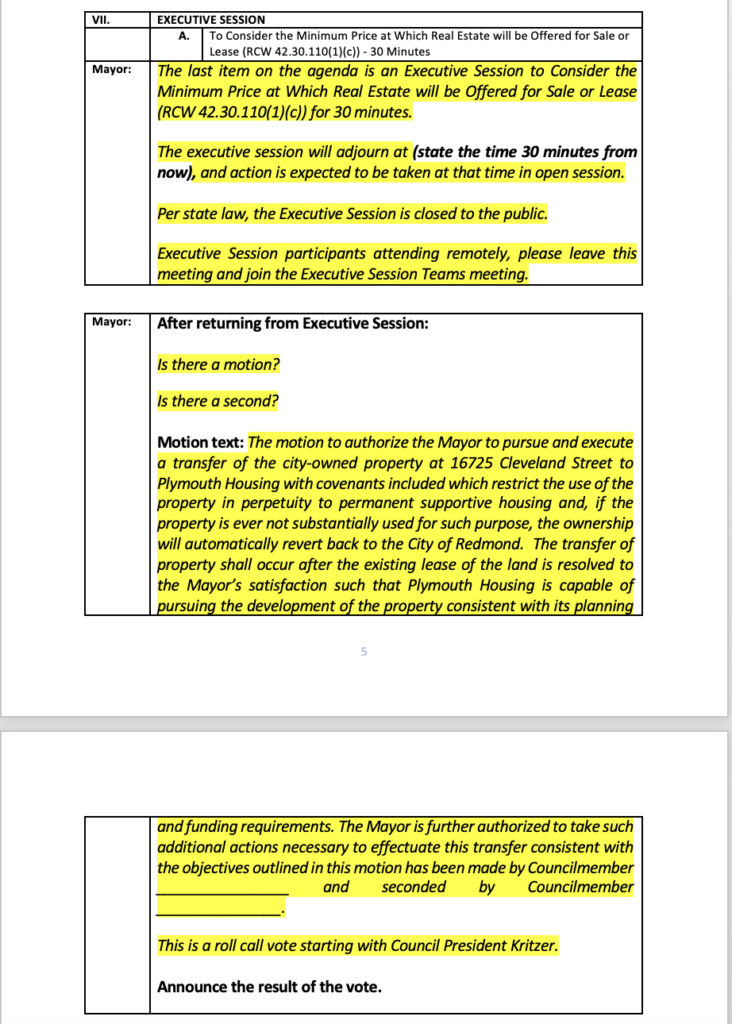
On February 7, 2024, in her email to to Director Helland and Deputy Director Seraphie Allen, ARCH Executive Director Lindsay Masters said, “I know Plymouth will ask what kinds of questions to prepare for – they had to bring in a whole bunch of staff to Kenmore because the questions were all over and got way into the weeds of compliance, tenant screening, Plymouth’s application process, etc. I am not expecting that here, but based on their experience they would rather be over-prepared.”
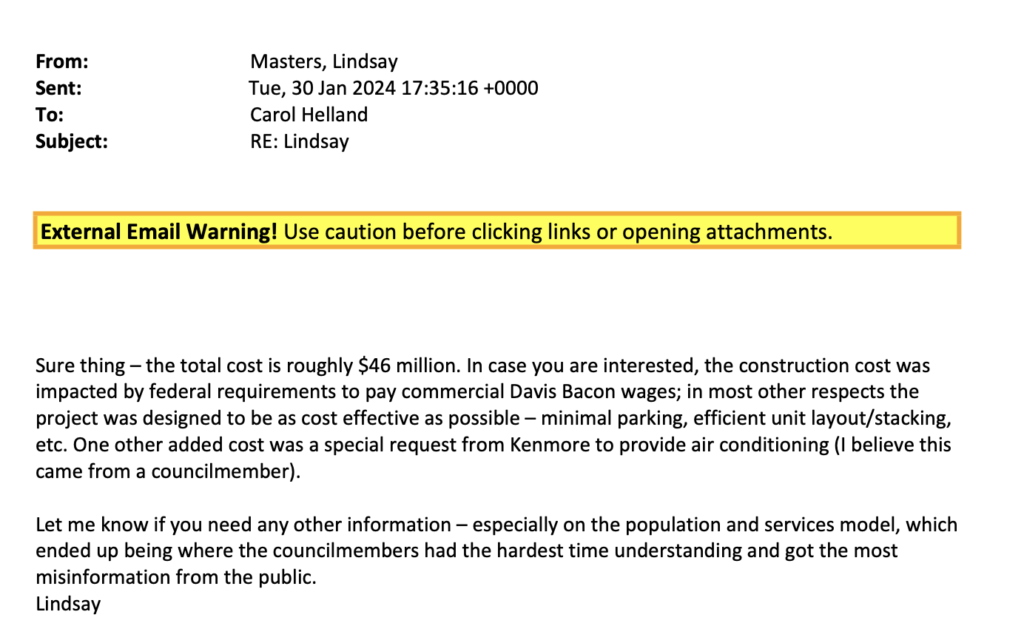
On February 10, 2024, a weekly update email from OneRedmond, Redmond’s Chamber of Commerce, said, “Council will approve the transfer of land at 16725 Cleveland St. to Plymouth Housing Development for the creation of supportive housing.” at the Special Meeting (Tuesday, February 13, 2024, 6:30 p.m.). Redmond Mayor Birney and Director of Planning, Carol Helland, were on that OneRedmond email.
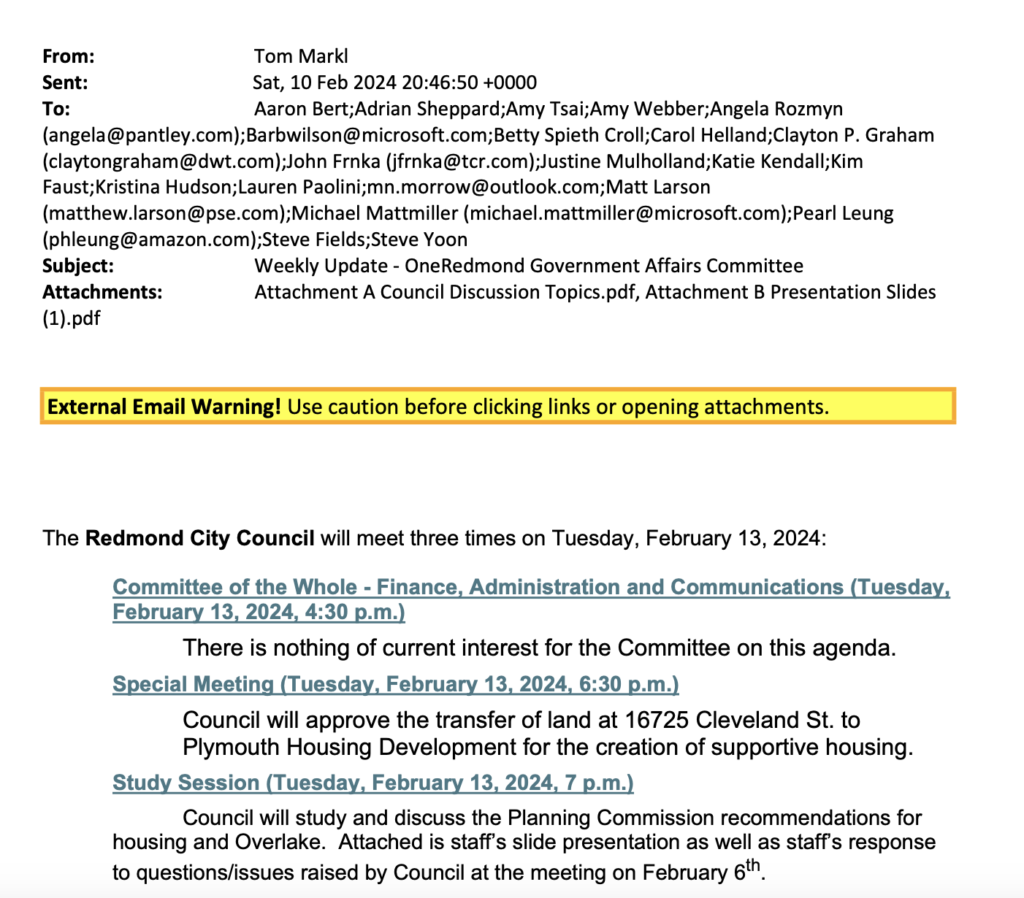
On February 13, 2024, Redmond City Council voted to approve the transfer of the Cleveland parcel to Plymouth Housing at no cost. No public comment was allowed before the vote took place. Below is the motion that the council passed 5 to 1. Councilmember Anderson voted No. Councilmember Field was absent. Notice that the final passed motion removed the reference to the “existing lease of the land”. If the council had a discussion to resolve the active lease, when and where was the public discussion?
I move to authorize the Mayor to pursue and execute a transfer of the city-owned property at 16725 Cleveland Street to Plymouth Housing with restrictions to include, but not limited to, limiting the use of the property in perpetuity to permanent supportive housing and, if the property is ever not substantially used for such purpose, the ownership will automatically revert back to the City of Redmond. Further, the Mayor is authorized to include additional restrictions and milestones that will ensure that the project, substantially as proposed, will be built and opened in a timely manner. The Mayor is further authorized to take such additional actions necessary to effectuate this transfer and to make necessary future amendments consistent with the objectives outlined in this motion.
The Redmond Plymouth Permanent Supportive Housing project is an inside job.
On February 20, 2024, legislators in Olympia took the “bold action” as the City of Redmond asked, and wrote two appropriation items in the 2024 capital budget. One is in the amount of $4.2 million from the Transit Oriented Housing Development Fund “provided solely for the Redmond Supportive Housing project”, exactly as the City of Redmond asked for. Another one is in the amount of $3.2 million from the Housing Trust Fund for Redmond Supportive Housing. Both the Senate and House did the “creative thinking” in the attempt to help the City of Redmond move the controversial Plymouth Housing project forward. The two appropriation items were sneaked in without any discussions, just as they brought the Plymouth Housing project to downtown Redmond with zero transparency and zero public input. When asked, Senator Mark Schoesler told us “As the ranking republican I have not been included.” Members of the House Capital Budget Committee also told us that they were not aware of these appropriations.


The City of Redmond adopts the same definition of “Permanent Supportive Housing” as defined in RCW 36.70.030
According to RCW 36.70A.030
(31) “Permanent supportive housing” is subsidized, leased housing with no limit on length of stay that prioritizes people who need comprehensive support services to retain tenancy and utilizes admissions practices designed to use lower barriers to entry than would be typical for other subsidized or unsubsidized rental housing, especially related to rental history, criminal history, and personal behaviors. Permanent supportive housing is paired with on-site or off-site voluntary services designed to support a person living with a complex and disabling behavioral health or physical health condition who was experiencing homelessness or was at imminent risk of homelessness prior to moving into housing to retain their housing and be a successful tenant in a housing arrangement, improve the resident’s health status, and connect the resident of the housing with community-based health care, treatment, or employment services. Permanent supportive housing is subject to all of the rights and responsibilities defined in chapter 59.18 RCW.
By Plymouth Housing’s own admission, their residents are “individuals with lack of rental history, criminal backgrounds, mental health and substance abuse issues, or other histories which typically exclude them from other housing.”

According to Mayor Birney’s Memo dated February 13, 2024, to qualify for staying at the downtown Redmond Plymouth Housing project, residents must have documented disabilities*, be below 30% AMI, and be currently homeless.

*According to ARCH Executive Director Lindsay Masters “requirements for documented disability in the project … was actually a misconception”. And the Plymouth project is not subject to any Federal Trust Fund requirement because this funding is not transferable from Kenmore to Redmond. However, the City refuses to publicly correct this requirement.
A clarification on the definition of disability. According to the state law and the common practices of the state, county, and city, mental illness and substance use disorder are all considered disabilities. Although admitted privately, the city has been refusing to publicly announce that disability is NOT an eligibility requirement for Plymouth Supportive Housing in downtown Redmond. The city wants to fill the Plymouth building with drug addicts.
According to the City of Redmond’s FAQ page:
Q: Where will the housing be located?
16725 Cleveland Street. This housing will be in Downtown Redmond, close to a light rail stop.
Q: Who will live there?
Single adults exiting homelessness and living on extremely low incomes would be eligible for the proposed Plymouth PSH. Many of these individuals are living with disabilities, seniors, and/or veterans. The income criteria is set at 30% or below Area Median Income (AMI), which means an individual is earning less than $28,800/year. Lifetime registered sex offenders and individuals with certain past drug-related convictions will not be eligible for this housing.
Comment:
- Why does the city NOT allow couples or families to live there? After all, the entire building is funded by taxpayer dollars.
- According to Mayor’s memo above, unless the seniors and/or veterans are homeless AND disabled, they will not be eligible to stay at Plymouth Housing in downtown Redmond. Estimates from the Census Bureau’s 2021 American Community Survey (ACS) say that only 46% of Americans ages 75 and older and 24% of those ages 65 to 74 report having a disability. As a matter of fact, according to Plymouth’s own data below, of those they served in 2023, only 11% were veterans, and there was no mention of seniors at all.
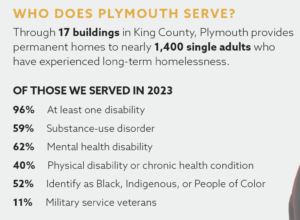
- According to the Washington Association of Sheriffs and Police Chiefs’ Registered Sex Offender Information page, “Adults who are required to register have been convicted a Class A, Class B, Class C felony or some gross misdemeanors and are required to register for life, fifteen years, and ten years, respectively. ” Yes, not all sex offenders are required to register for life. In other words, the Plymouth Housing project in downtown Redmond will allow some registered sex offenders. Plymouth’s own FAQ confirms this: “Regarding sex offenses, KCHA will specifically screen out lifetime registered sex offenders and/or those with Class A felonies. Beyond KCHA’s screening, Plymouth assesses the suitability of applicants internally. If an applicant has a sex offense permitted by the KCHA, Plymouth will allow the applicant to provide supplemental information related to the offense. A group of directors from Plymouth will review this information and will make an assessment with the safety of the residents, staff, and community in mind.”

- According to the same Plymouth’s own FAQ, “Regarding drug-related offenses, KCHA will screen specifically for manufacture of meth, screening out convictions less than five years old. In line with the Housing First philosophy, Plymouth does not conduct additional screenings related to drug offenses.” In other words, the Plymouth Housing project in downtown Redmond will allow drug addicts and some drug dealers.

Q: Is this a homeless shelter?
No, this is Permanent Supportive Housing for single adults. There is an application process, which includes determination of eligibility for the project. After individuals are approved and move in, they will no longer be considered homeless. Residents are responsible for abiding by their lease agreement and building rules, while also having access to onsite support services.
Q: How big is the building?
The building will contain 100 units total with ground floor office space, commercial space, and amenity areas for the residents.
Q: When will the building open for occupancy?
There is not a specific timeline for construction yet. However, the goal is to break ground in 2025. Typically, it takes about two years of construction prior to opening for operations.
Q: Is there drug-testing?
Rather than providing drug testing, Plymouth uses the best practices in the medical and behavioral health fields to help people achieve a greater degree of health and well-being. They also provide a variety of opportunities for people to work toward recovery from substance-use disorder. For most of their buildings, Plymouth must abide by landlord-tenant laws mandated by the federal government which prohibits drug-testing. In order to remain housed in a Plymouth building, residents must abide by their lease, follow building rules, and ensure the health and safety of themselves, Plymouth staff, and its neighbors.
Comment: This is equivalent to saying that the Plymouth Housing project in downtown Redmond will allow drug use. Again, this is confirmed by Plymouth’s own FAQ: “Regarding legal substance use, Plymouth’s harm reduction approach means permitting private use (like what can happen in any home) that does not interfere with the community. “

Q: What was this location’s intended use if it wasn’t developed by Plymouth Housing?
The Cleveland Street site was purchased in 2019 prior to construction of the Downtown Redmond Link Extension of the Sound Transit light rail project. The southern portion of the site was needed to accommodate the light rail alignment and was dedicated to that purpose. The remainder of the site was retained by the City to provide an opportunity for deeply affordable housing in a transit-oriented development. In its 2023-24 budget, the City allocated $10 million to advance affordable housing opportunities both on the Cleveland Street site and on other city-owned properties.
According to the City of Redmond’s FAQ in 2021
Q10: Are there homeless people in Redmond?
There were only 64 homeless people with direct tie to Redmond area in 2021.
